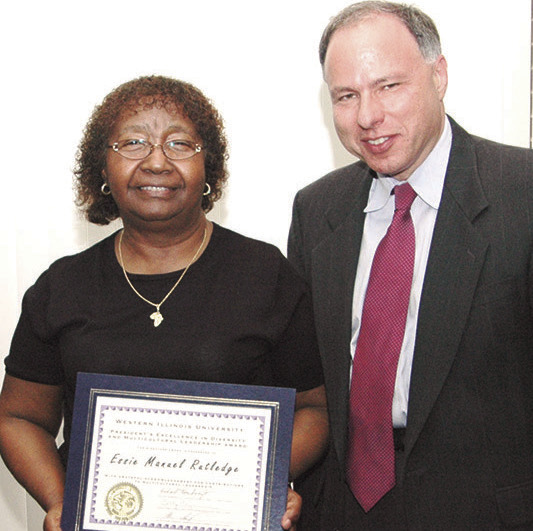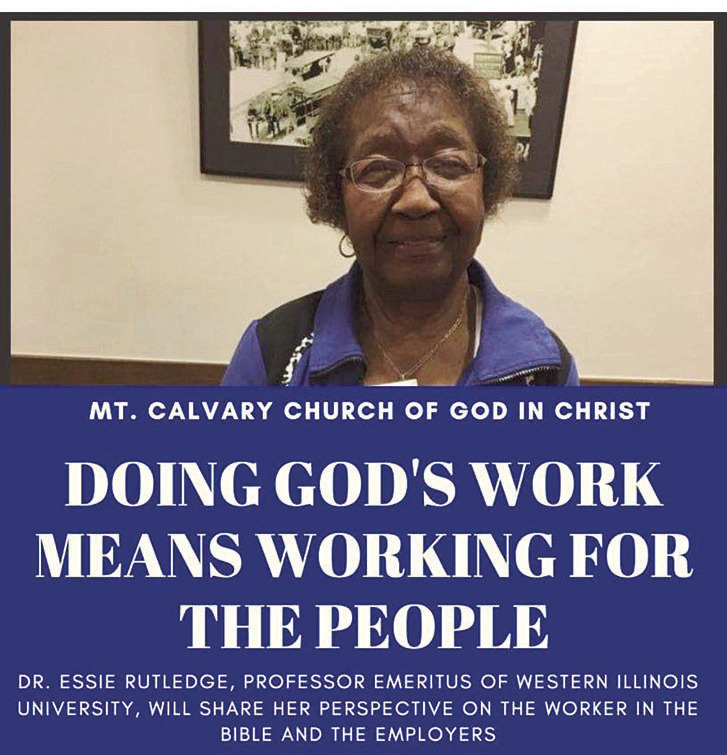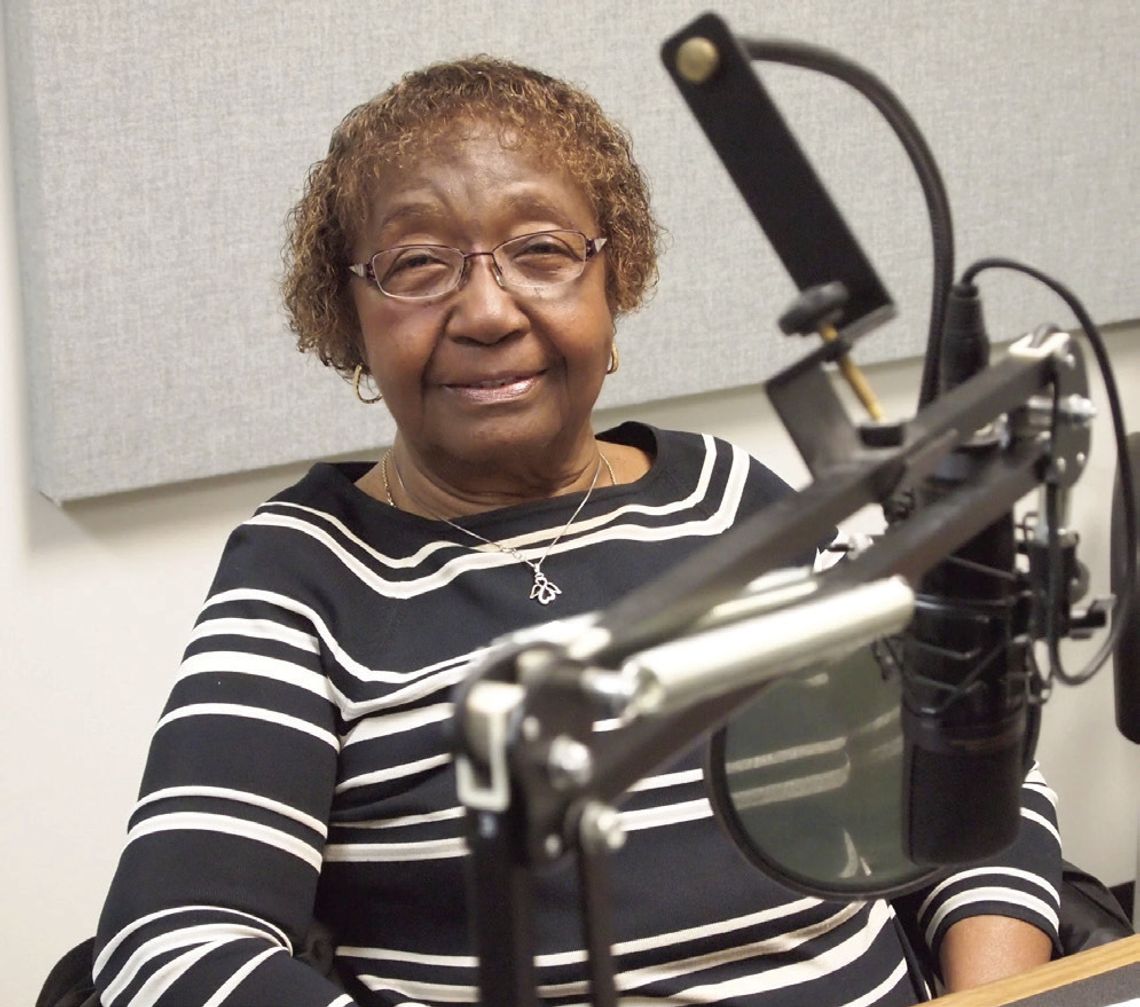Storied Sociologist & Pioneer in African American Studies, Women’s Rights, Equity & Social Justice
MACOMB – Macomb, the region and the nation has lost a trailblazing individual who not only paved the way for Black students, faculty and staff at Western Illinois University, in her community and beyond, she also shattered numerous glass ceilings over the years, upheld workers’ rights and committed her life and work to social justice and equity.
WIU Sociology Professor Emerita Essie Manuel Rutledge passed away during the evening of Sunday, June 1 in Merrillville, IN, according to her son, Jeffrey Rutledge, who posted the news of his mother’s passing on Facebook June 1.
“I need to post this because I cannot contact all the folks around the country and at Western Illinois, along with her many alma maters and professional organizations,” Jeffrey wrote. “She has a multi-level reach which I cannot get to on my own. I’m a little overwhelmed and numb. She was a scholar, activist, friend, advocate, sister, aunt, grandmother and my mother. She will be and is deeply missed.”

Rutledge joined WIU’s faculty in 1976 when she was named the first Black female chair of the African American Studies Department (and was the first Black woman to serve as chair at WIU). She later joined the sociology and anthropology department in 1985, where she taught until her retirement in 2006.
[Editor’s Note: A web search of Essie Manuel Rutledge brings page-after-page of citations from scholarly articles, books, journals and other publications, presentations and papers authored, co-authored, edited and/or presented by Dr. Rutledge].
Before arriving at Western, she was an assistant professor of sociology at the University of Michigan-Flint, and was a National Teacher Fellow/Assistant Professor of Social Sciences at Macomb County Community College, Warren, MI. Earlier in her career, Rutledge was an instructor of social sciences at Gibbs Junior College and at St. Petersburg (FL) Junior College. She began her career as a social studies teacher at Sixteenth Street Junior High School in St. Petersburg.
She began her educational journey as a student at Florida A&M University, obtaining a Bachelor of Arts Degree in Sociology in 1958, and later attended the University of Wisconsin, completing a Master of Arts Degree in Sociology in 1965. She was the first Black woman to earn a Doctor of Philosophy Degree (Ph.D.) in Sociology from the University of Michigan in 1974. Rutledge was also certified as a specialist in aging by North Texas State University Center for Studies in Aging in 1986.
Just prior to her retirement, Rutledge received the University’s 2006 Affirmative Action Director’s Award, which recognized campuswide leadership reflecting the spirit of the University diversity efforts.
In 2019, Rutledge was honored by the Macomb Feminist Network with that year’s Writing Women into History Award for her “advocacy for equity through her mentoring of individuals on and off campus, and through her participation in multiple organizations, including the Macomb Equal Opportunity and Fair Housing Commission, the Lions Club, the NAACP and the Western Illinois Regional Council.”
“The passing of Dr.
Rutledge deeply saddens me. I came to Western as a nontraditional undergraduate student shortly after Dr.
Rutledge arrived on campus.
We met at the former Gwendolyn Brooks Cultural Center, which was located across from Lake Ruth. She took me under her wings and quietly mentored me, a single mom with two young children,” Belinda Carr, former director of the Gwendolyn Brooks Cultural Center at WIU and current chair of the McDonough County Democratic Central Committee, shared. “Dr. Rutledge was a passionate, outspoken advocate for students, faculty and staff. She was a principled individual who worked tirelessly fighting injustice and for equal rights for all of humanity. She also supported individuals and families dealing with racist attitudes in the workplace and the local school district. Dr. Essie Rutledge enriched the lives of everyone she interacted with and is truly an icon who will be missed!”
In addition to chairing the African American Studies department, Rutledge also facilitated the creation of WIU’s Women’s Center and served on its advisory board.
She was also a longtime member of UPI, WIU’s faculty union, noting that women and people of color were often disadvantaged in salary and promotion negotiations; however, she was committed to the needs of all University personnel, according to the 2019 award nomination.
“Rutledge looked out for traditionally underrepresented individuals, has been able to call attention to inequity, and stands her ground whenever justice is threatened,” her nominator said.
WIU President Kristi Mindrup recalled when she was a young professional at Western and met Dr.
Rutledge for the first time, “She was a faculty member dedicated to creating space for students to explore new ways of understanding and viewing the world and themselves. Living out her commitment to creating opportunity, Dr. Rutledge often offered courses during times and formats that were accessible to adult learners and working students,” Mindrup said. “Dr. Rutledge will be remembered for her positive impact on WIU, her discipline, the community and especially students.”
While she made her home in Macomb for many of her years, Rutledge was well-known throughout the United States for her work in sociology, Black woman and the family, aging and social psychology. She was the recipient of the Albert Nelson Marquis Lifetime Achievement Award by Marquis Who’s Who.
Throughout her career, Rutledge had been recognized for her many professional and civic contributions, and in the community, she was the first recipient of a new award established by the McDonough County Democrat Coalition and Democratic Party, the “Essie Manuel Rutledge Humanitarian Spotlight Award for Social Justice in Action” (named in her honor). She had also served as president of the Lions Club.
“Dr. Rutledge was very well-known in her community, and was prolific in her stance for equity and justice not just in Macomb, but in the state of Illinois and across the country,” said Macomb Mayor Mike Inman. “Her dedication to human rights, diversity, equity and inclusion spanned many decades, and she made our community a better place.”
Services are pending.










